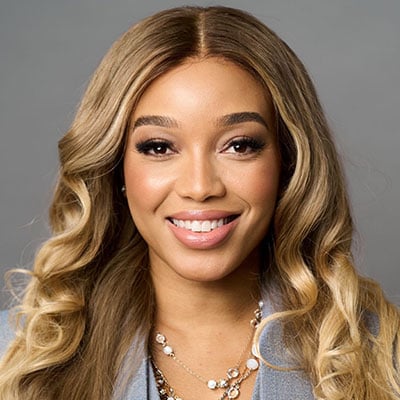Q&A: How Kirkland Partner Sierra Elizabeth Balances Clients and Her Own Clothing Line
Kirkland partner Sierra Elizabeth spoke with Reuters about her legal career and plans for her fashion business in the wake of the coronavirus pandemic.
Sierra Elizabeth still remembers what it felt like to sit through her first round of summer associate interviews, with pent-up anxiety and a not-so-tailored suit.
Now she's got confidence to spare as a partner at one of the world's most profitable law firms, with an equity stake in her firm, a full wardrobe and her own women's custom-suit company.
Elizabeth is a Kirkland & Ellis litigation partner in Los Angeles who has represented the likes of General Motors, Scotts Miracle-Gro Company and Warner Bros. Almost three years after making partner at Kirkland in 2015, she launched her company, SuitKits, with the goal of providing tailored, customizable suits for working women.
The COVID-19 pandemic has redefined professional workwear (sweat pants and Zoom meetings, anyone?), but Elizabeth isn't giving up on her suit venture.
"The best opportunities come at the worst time," Elizabeth said. "That has been so true for my career."
Reuters spoke with Elizabeth about her career at Kirkland and her plans for her fashion business in the wake of the coronavirus pandemic. The interview has been edited for length and clarity.
REUTERS: How did you get your start at Kirkland?
ELIZABETH: I did not have any lawyers in my family. I had no idea what I was getting myself into. Coming into this industry was very difficult and probably more difficult than others' experiences.
I summered at Kirkland and Ellis. As a first-year, I was able to get my resume through. I was immediately embraced by my mentor-turned-sponsor, Mark Holscher.
I was capable and smart enough for this job but I had no idea how to navigate it. I'd have to say that part of the reason why I've continued on this path is not just for me, but for the people that are coming behind me.
REUTERS: I'm sure there are a lot of people looking up to you within the firm. Do you have any mentees? Where do you see some of the challenges in being a mentor?
ELIZABETH: I am a mentor to too many to count.
I've found that organic relationships really can change and help your career. What I try to do in terms of identifying the mentee relationships is really get to know people on a more personal level.
When I care about a mentee on a personal and human level, it becomes much more easy for me to adequately mentor because it's no longer a job, it's a privilege. I feel like the challenge for me is spreading myself too thin. A lot of people want to have me as a mentor and have my colleagues as mentors, so it becomes difficult when we're trying to give people the attention that they deserve.
I do try to be a little bit strategic in the relationships that I focus most of my energy on and cultivate.
REUTERS: I want to switch over to your company, SuitKits, and how you found time to create your own business. How did you get started with SuitKits?
ELIZABETH: When I'm not busy, I find additional things to do. That's how life works when you're young and you're single. You think you're so busy that you can't fit anything on your plate, but you always find time when there's a need to find time.
I can remember when I was interviewing at all these big law firms across the country. I was wearing the most uncomfortable, boxy and ugly suit because there was nothing else out there for me to wear. That was almost 12 years ago at this point. It wasn't a great suit and it just made me feel more insecure.
I started to become the interviewer on recruiting trips and I saw that same lack of confidence and awkwardness in women. When I started researching this, I got the same responses from so many women about the how suits had limited color selection and were made for male bodies.
So eventually, I thought, 'Well, if nobody else is trying to solve this problem. I'll try to solve the problem.' I didn't really have time for it, but I thought it was necessary and I was passionate about it.
REUTERS: Who has inspired some of the designs of your suits?
ELIZABETH: When I envisioned this, I wanted women seeing themselves in a different light. I had this 'I am woman, hear me roar' type of picture in my head. I think it's only become more concrete now that you have Kamala Harris and all of these very powerful women in suits who you're seeing in the limelight.
COVID has changed a lot of things and it has impacted the business. We're trying to figure out kind of what our pivot is. I definitely think that there is still this need for women to have these powerful statements through their clothing.
REUTERS: I'm glad you touched on COVID-19. You've recently put SuitKits on pause. How do you think the need for suits will change after people return to the office?
ELIZABETH: When we came up with SuitKits, we wanted to start with suiting because we knew that there was a need in the marketplace for that. Before COVID, I was in court every week and I did need a suit every week.
COVID will be over at some point, but it has, I think, forever changed us as a culture. I want to thoughtfully spend time on what makes the most sense for the future before continuing along the same path. A lot of what SuitKits was doing before will still carry through, but I want to take this to the next level.

